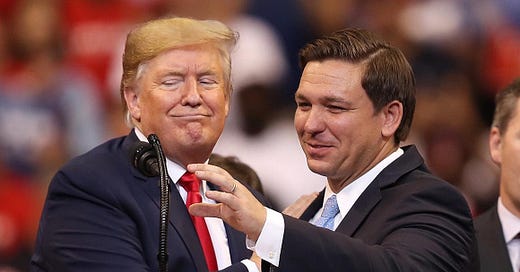With only one day to go - the New Hampshire primary is on Tuesday - Ron DeSantis called it and suspended his run to become the GOP’s nominee for the presidency. There may have been many reasons, but suffice it to say that the man who ran as the alternate Trump is no substitute for the real thing and thus had no real chance. Nikki Haley, as a distinct moderate and a more establishment candidate can keep going until the primaries reach her home state of South Carolina later in February. She is the sort of ‘what if’ candidate, the person sitting on the bench to step up if for whatever reason the deck is cleared. But as the GOP is becoming Trumpier and Trumpier even that may prove to be a faint hope and in the end a lonely place to be. We’ll see.
DeSantis gave it a shot and he may actually be the post-Trump candidate and emerge in 2028 or even in 2040 at which point he will be some twenty years younger than the current sitting president of the United States. Over the weekend I listened to this really insightful interview with Jeff Greenfield, the former ABC, CNN and CBS political journalist who is a walking encyclopedia of presidential campaigns. Retired now in Santa Barbara, he calmly lays out how Trump was able to capture the GOP and how in his expected second term all the constraints from term one will have been removed. Greenfield giving us his sober and realistic take on events. Recommended.
Middle East Peace?
And talking about the incumbent of the White House, the pressure on Israel has now begun in all earnest. And while Biden loves and has professed strong support for Israel, his domestic calculations are telling him that a solution in the Middle East is probably going to be helpful in an election year. And it is not just the US that has unleashed another attempt to move Israel away from its war in Gaza and towards a political solution. Canada and a number of European countries have come out with similar statements on the two-state solution last week as the ultimate goal to establish peace. Biden is not negative:
After speaking to Netanyahu on Friday – a conversation that included some discussion of post-war governance for Gaza – Biden expressed optimism that Netanyahu could eventually accept a two-state solution "given the right one."
Except that Bibi is not interested in a two-state solution and he made that clear over the weekend. He was probably given the ‘wrong one’. His calculations are equally political in that there is no support whatsoever among his coalition partners to pursue this course, nor is there in Israeli society at large. This was a questionable proposition before October 7th, let alone after it. And Hamas, by way of Khaled Meshaal, also reiterated their sincere and honest disinterest in the concept. It is not viable and given current circumstances it borders on being a fantasy. It is only a vaguely defined end goal and no one even has a basic understanding of how to get there given the current circumstances. From the Israeli cabinet’s point of view the focus is on destroying Hamas while discussing a two-state solution is an actual separate matter entirely.
So, the question needs to be ‘when’ can we really explore a two-state settlement, ‘what’ could it potentially look like and ‘how’ are we going to get there. At present the concept only serves as a tool to guide discussions, keep Saudi Arabia at the table and bring about a possible interim settlement that may see released hostages. To try and race to a deal, bring in too many different components while not understanding each parties’ motivations is unlikely to bring success. It will be a short-sighted exercise that will mostly hurt the people directly affected by this conflict.



